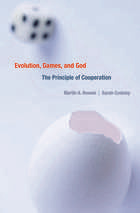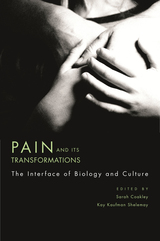
According to the reigning competition-driven model of evolution, selfish behaviors that maximize an organism’s reproductive potential offer a fitness advantage over self-sacrificing behaviors—rendering unselfish behavior for the sake of others a mystery that requires extra explanation. Evolution, Games, and God addresses this conundrum by exploring how cooperation, working alongside mutation and natural selection, plays a critical role in populations from microbes to human societies. Inheriting a tendency to cooperate, argue the contributors to this book, may be as beneficial as the self-preserving instincts usually thought to be decisive in evolutionary dynamics.
Assembling experts in mathematical biology, history of science, psychology, philosophy, and theology, Martin Nowak and Sarah Coakley take an interdisciplinary approach to the terms “cooperation” and “altruism.” Using game theory, the authors elucidate mechanisms by which cooperation—a form of working together in which one individual benefits at the cost of another—arises through natural selection. They then examine altruism—cooperation which includes the sometimes conscious choice to act sacrificially for the collective good—as a key concept in scientific attempts to explain the origins of morality. Discoveries in cooperation go beyond the spread of genes in a population to include the spread of cultural transformations such as languages, ethics, and religious systems of meaning.
The authors resist the presumption that theology and evolutionary theory are inevitably at odds. Rather, in rationally presenting a number of theological interpretations of the phenomena of cooperation and altruism, they find evolutionary explanation and theology to be strongly compatible.

Pain is immediate and searing but remains a deep mystery for sufferers, their physicians, and researchers. As neuroscientific research shows, even the immediate sensation of pain is shaped by psychological state and interpretation. At the same time, many individuals and cultures find meaning, particularly religious meaning, even in chronic and inexplicable pain.
This ambitious interdisciplinary book includes not only essays but also discussions among a wide range of specialists. Neuroscientists, psychiatrists, anthropologists, musicologists, and scholars of religion examine the ways that meditation, music, prayer, and ritual can mediate pain, offer a narrative that transcends the sufferer, and give public dignity to private agony. They discuss topics as disparate as the molecular basis of pain, the controversial status of gate control theory, the possible links between the relaxation response and meditative practices in Christianity and Buddhism, and the mediation of pain and intense emotion in music, dance, and ritual. The authors conclude by pondering the place of pain in understanding--or the human failure to understand--good and evil in history.
READERS
Browse our collection.
PUBLISHERS
See BiblioVault's publisher services.
STUDENT SERVICES
Files for college accessibility offices.
UChicago Accessibility Resources
home | accessibility | search | about | contact us
BiblioVault ® 2001 - 2024
The University of Chicago Press









